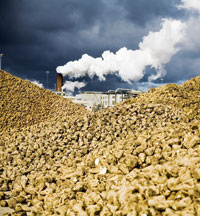Fuelling sugar beet’s future

UK farmers could be at the forefront of a massive growth in bioethanol production, according to speakers at this week’s World Association of Beet and Cane Growers conference in Cambridge.
The International Sugar Organization’s Peter Barron predicted a doubling of global ethanol by 2015 to 130-150bn litres and trade in fuel ethanol could jump from 4bn litres to 21-25bn as government policies favoured greener fuels.
“Ethanol production accounts for around 20% of cane harvested and 3% of beet and I’m cautiously optimistic those proportions will increase,” he said.
Countries such as the USA, Brazil, India and Thailand were among the key bioethanol producers, but Europe could also play a big part, utilising sugar beet crops as well as cereals.
“The EU sugar regime reform is considered to have been largely successful by concentrating production in the most efficient areas and making it more able to compete with cane-based producing countries,” ED&F trading analyst Mauro Virgino said.
“The sustainability and environmental criteria of biofuel are increasingly important and the EU is well-placed to meet these requirements.”
Geraldine Gilmartin from industry analysts, Kingsman said European bioethanol production capacity was increasing, but there was still a 1bn litre deficit, which was mostly being filled by Brazilian imports. US corn-based ethanol had also started coming into Europe due to surplus capacity in Central and South America, but she did not see America as a long-term ethanol supplier.
“The main aim for the USA is to protect its own industry and it isn’t really looking for a niche market in Europe. Plus, corn-based ethanol has a relatively low rating for greenhouse gas savings, which could be an issue when the Renewable Energy Directive comes in next year and sets higher standards for greenhouse gas savings.”
The UK government’s RTFO mandate for biofuels to make up 3.5% of transport fuels (by volume) had boosted the sector, despite duty rates for biodiesel and bioethanol being increased to the same level as conventional petrol and diesel from April this year, she said.
But more attention was falling on bioethanol rather than biodiesel and she predicted UK bioethanol consumption could double to 600m litres this year, while biodiesel consumption was likely to remain flat. UK ethanol production was likely to be around 325m litres in 2010.
Two of the biggest UK bioethanol facilities are the Ensus plant on Teesside, which came on stream earlier this year with an annual capacity of 400m litres of bioethanol, and the 420m litre Vivergo plant at Hull, due to begin production in 2011.
While feed wheat rather than sugar beet is the main feedstock for both plants, British Sugar is a partner in the Vivergo venture and also has its own bioethanol facility at its Wissington sugar beet factory in Norfolk, producing 70m litres of bioethanol a year.
The site was initially developed to ‘mop up’ surplus ‘C’ quota beet, but the company also grows around 200,000t of beet itself to ensure feedstock supply for the plant, the company’s agriculture director, Colm McKay, said.
“We are constantly reviewing whether we can expand our bioethanol production from beet, but have no plans to grow any more beet ourselves. We would love to see more beet grown in the UK to expand some of these alternative markets,” he said.
• code123
